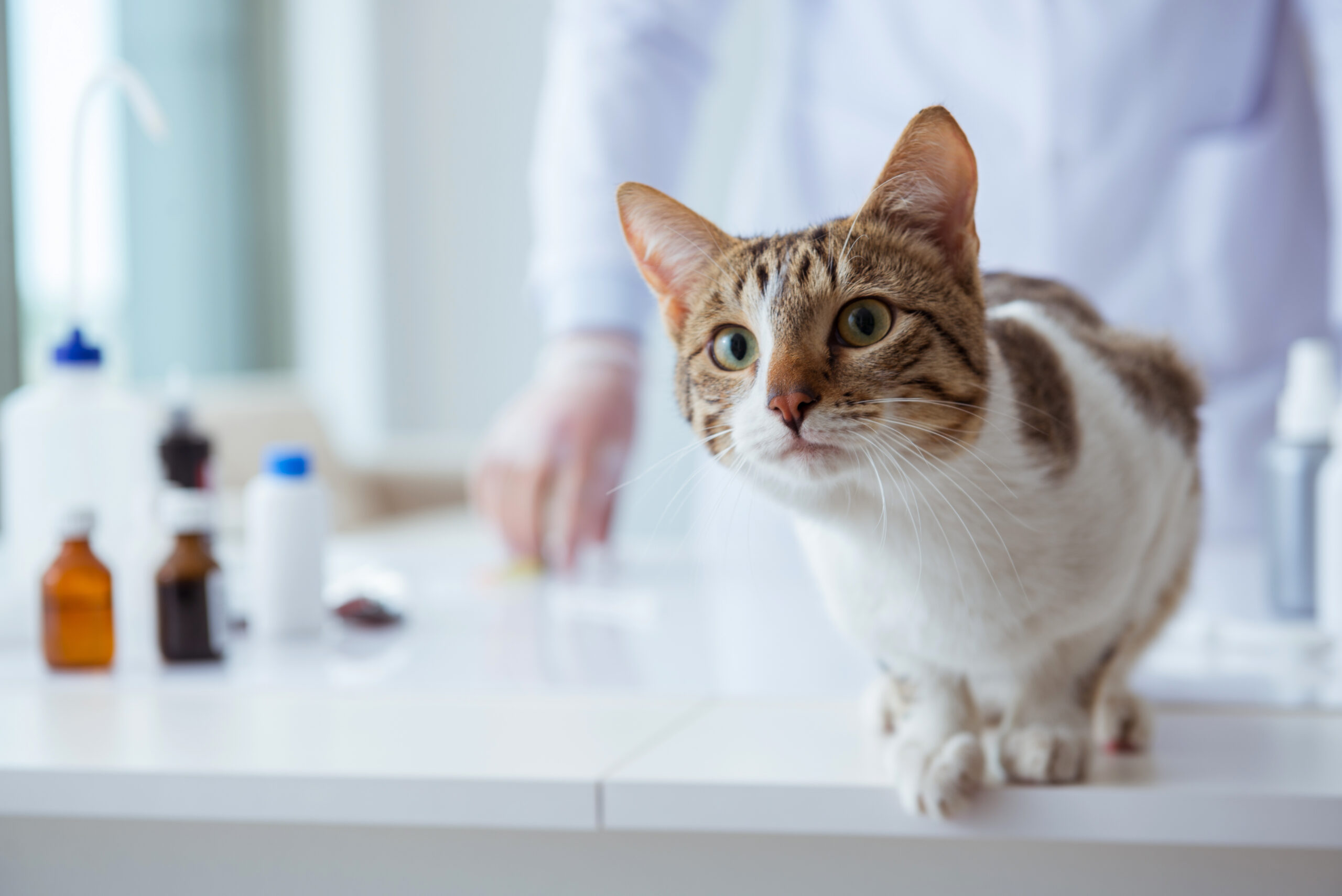
Veterinary Care
Extraordinary Veterinary Care
Our veterinary care philosophy is simple. We treat your pet as we would our own. Truly extraordinary and personal, our mix of services is what every pet owner needs.
Primary Care
- Urgent Care – We provide same day service for sick/injured pets during regular Pet Clinic Hours. Waiting several days to have your pet assessed may result in higher costs and slower recovery time. We highly encourage you to call and discuss your concerns. Together, with your input, we can determine if your pet needs to be seen immediately.
- Dental Programs – Just like humans, your pet’s dental health is a key component of wellness. We offer prevention programs for one of the most commonly overlooked medical issues that can lead to major problems (and expenses) later in your pet’s life. In addition, our veterinary staff diagnoses and treats tooth root issues, fissures, oral cancer and provides tooth extractions.
- Geriatrics – Most older pets require special care. At their advanced stage, they can benefit from treatments and procedures to enhance their quality of life and extend their lifespan.
- New Puppy/Kitten Programs – Beyond vaccinations, your new pal will receive a thorough exam and an individualized wellness plan. We also provide breed recommendations, infant/child-puppy safety, and house training strategies. In addition, we offer Puppy Class at The Groom & Board.
- Nutritional Counseling – Proper nutrition is the foundation of your pet’s overall health. Nutritional needs change at various life stages. We recommend Purina and Royal Canin products for wellness, and special prescription diets for treatment of liver, kidney, and bladder dysfunction, obesity, allergies, and other disorders.
- Wellness Programs – We provide customized recommendations based on lifestyle to prevent illness and disease.
- Pocket Pets and Birds – The Animal House welcomes your extra special friends into the care of our experienced staff.
Special Focus
- Orthopedics – Chronic pain and lameness results in significant reduction in quality of life and shorter life spans. Our veterinarians surgically correct select cruciate injuries, luxated patella, hip dysplasia, and general fractures. For cases requiring orthopedic specialists, we have strong relationships with area referral clinics.
- Abdominal Surgery – Our surgical staff are skilled in a variety soft tissue surgery including removal of the spleen, liver, kidney and gall bladder. In addition, we provide expertise in stone removal of the kidney, bladder and urinary tract.
- Nose and Eye Capabilities – A common medical issue for specific breeds, we offer corrective surgery of the nose and eye when necessary.
- Behavioral Medicine – Our clinic is highly successful in diagnosing and treating anxiety, aggression and other related disorders. In most cases, your pet and household will get back to “normal.” Our dog daycare may provide relief as well. Used as a form of therapy, the extra activity and socialization can decrease or even eliminate many distressing problems for our canine friends. Group or One-On-One training at home with our dedicated trainers are additional options for entrenched behavioral issues.
- Dermatology – A common problem with often highly complex root causes, our veterinarians go beyond standard treatments of antibiotics and steroids and work diligently to accurately diagnose and resolve.
- Reproduction – For breeders and pet owners alike, our capabilities in this area are quite extensive: Early stage pregnancy diagnosis (30 days), artificial insemination, surgical artificial insemination, and c-section.
Technological Capabilties
ABAXIS In House Lab – You won’t have to wait with our state of the art system. With immediate blood results, most treatment recommendations can be made quickly resulting in faster recovery.
Ultrasound Imaging – This essential service is used to detect abdominal masses/stones, aid in biopsies, and diagnose early pregnancy.
Digital X-Ray – In house radiography for rapid and accurate diagnosis. If needed, allows for on-site file sharing and consults with referral veterinarians.
Electrocautery – Aids in the removal of masses and growths. Decreases bleeding.
Blood Transfusion – For emergency situations during Pet Clinic Hours.
Echocardiogram – An Echocardiogram uses sound waves to create pictures of the heart.
FAQs
Are there any other vaccinations required for dogs?
The rabies vaccine is required by law for dogs. In addition, all dogs should have a distemper combination vaccine on an annual basis. Dogs that attend daycare and boarding facilities, receive grooming services, or participate in group training classes are required to receive the Bordetella vaccine. This is easily administered as an intransal. Dogs that frequent environments where deer ticks reside should be immunized against Lyme disease. Lyme vaccine is also administered in a series of two injections, 3-4 weeks apart and then boostered annually. The Animal House also strongly recommends the CIV vaccine which guards against Canine Influenza Disease.
At what age can my pet be spayed or neutered?
Spaying or neutering should take place by 6 months of age. Spaying a female prior to her first heat cycle significantly reduces the incidence of mammary tumors, ovarian cancer, and uterine infection, and has the obvious benefit of no unplanned pregnancies. Neutering a male pet at 6 months helps prevent future prostate problems and greatly reduces the occurrence of serious behavior issues, such as inappropriate elimination (“marking territory”), aggressiveness, and the desire to run in search of a mate. In addition, many daycare facilities, including The Animal House Groom & Board, cannot accept unneutered dogs after 6 months of age.
I have a new kitten. When should I start vaccinations?
Vaccinations for kittens are generally started at 6-8 weeks of age. A distemper combination (FVR-CP) is given every 3-4 weeks until the kitten reaches 12 weeks of age. It is then boostered annually. The rabies immunization, while not required by law, is highly recommended. It is given at 16 weeks of age and is good for one year. After that, rabies vaccines are administered every three years.
I have a new puppy. When should I start vaccinations?
Vaccinations are generally started at 6-8 weeks of age. A distemper combination (DHLLP) is given every 3-4 weeks until the puppy reaches 16 weeks of age. The distemper combination is typically boostered annually, however other vaccine options also exist. The rabies vaccine is given at 16 weeks of age and is good for one year. After that, the rabies vaccine is administered every three years.
I want to bring a new cat or kitten into my home. Do I need to test my new pet before introducing it to new family members?
We strongly suggest testing for feline leukemia and feline immunodeficiency virus. These diseases are both highly contagious and fatal for cats and family members. Prior to bringing any new kitten or cat into your home, your pet should receive the FeLv/FIV test to check for these serious viruses. A simple blood test provides results in 15 minutes. If the test results are negative and your cat will spend time outdoors, we advise immunizing against feline leukemia with a two-shot series given 3-4 weeks apart and then annually.
Is it really safe to put my pet under anesthesia for a procedure?
Any time anesthesia is administered, a certain amount of risk exists. If your pet is generally healthy and in the normal weight range, it is likely the risk will be slight. In almost all cases the health benefits of performing the procedure are far greater than the anesthetic risk.
To decrease risk to the lowest possible level, we recommend a pre-anesthetic screen on all pets, healthy or not, prior to all anesthetic procedures. This simple blood test, performed the morning of surgery, flags our veterinarians for possible complications by assessing kidney and liver values, glucose levels, etc. Should there be a health concern, additional testing may also may be advised prior to the scheduled procedure.
My pet is really sick or hurt and I want to get in immediately. Will you take emergency or urgent care patients?
Yes, during regular Pet Clinic Hours. If you are concerned, your pet can be seen that day. Please call first so we can do an assessment over the phone to determine urgency and how to most efficiently handle your pet’s problem. When the clinic is closed, emergency care is provided by the Blue Pearl Emergency Pet Hospital, located at 2141 Lime Kiln Road Green Bay, 920-494-9400.
What type of payment do you accept?
We accept cash, MasterCard, Visa, Discover, and Care Credit. Payment is required at the time of service.
When should I bring in a stool sample?
Typically your adult pet is checked for intestinal parasites once a year, during the annual exam. If you have a puppy, we recommend running two fecal tests several weeks apart to ensure your puppy is parasite free. If your pet is sick with vomiting and diarrhea we will also ask that you bring in a sample at the time of your office visit.
Pets can pick parasites up very easily from other animals. Undiagnosed parasites make your pet miserable and can result in chronic diarrhea. It is important for your pet’s health and comfort to follow our guidelines.
Why does my dog need to be tested for heartworm disease prior to putting him on heart worm preventative?
It is important to test your pet for heart worm disease before starting preventative to ensure the heart worm parasite has not already been contracted.
